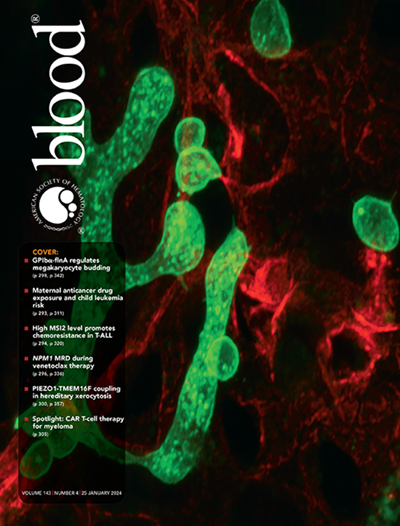Efficacy and safety of azacitidine for VEXAS syndrome: a large-scale retrospective study from the FRENVEX group.
IF 21
1区 医学
Q1 HEMATOLOGY
引用次数: 0
Abstract
VEXAS (Vacuoles, E1 Enzyme, X-Linked, Autoinflammatory, Somatic) syndrome is a severe monogenic disorder caused by somatic UBA1 mutations, characterized by inflammation, cytopenias and frequent association with myelodysplastic neoplasms (MDS). Steroid dependence is common, and targeted therapies have demonstrated limited efficacy. Azacitidine (AZA), a hypomethylating agent used in MDS, has shown potential in VEXAS but data remain limited. This multicenter retrospective study assessed AZA efficacy and safety in 88 genetically confirmed VEXAS patients from the FRENVEX (French VEXAS) group, 80% meeting WHO 2022 MDS criteria. Inflammatory response rates were 41% at 6 months and 54% at 12 months, regardless of MDS status. A total of 50 (61%) patients achieved inflammatory response, with 70% occurring at 6 months, suggesting a delayed median response. Among responders, relapse-free survival on AZA was 90% at 1 year and 85% at 5 years. Of the 12 responders who discontinued AZA, 9 relapsed after a median of 3.1 years (range: 0.4-5.6), with effective re-exposure in 4 of 5 patients. Hematological responses included red blood cell transfusion independence in 65% and platelet improvement in 77% of patients. Molecular response, defined as a ≥25% reduction in UBA1 variant allele frequency (VAF), was observed in 65% of patients, all of whom achieved inflammatory and hematological responses; and VAF dropped below 2% in 43% of cases. Infections (34%) and cytopenias (36%) were common, particularly during the first three cycles. This study establishes AZA as an effective therapy for VEXAS, improving inflammation, cytopenias, and UBA1 clonal burden, warranting larger prospective trials.阿扎胞苷治疗VEXAS综合征的疗效和安全性:一项来自FRENVEX组的大规模回顾性研究
VEXAS (Vacuoles, E1 Enzyme, X-Linked, Autoinflammatory, Somatic)综合征是一种由体细胞UBA1突变引起的严重单基因疾病,以炎症、细胞减少为特征,常与骨髓增生异常肿瘤(MDS)相关。类固醇依赖是常见的,靶向治疗已证明疗效有限。阿扎胞苷(AZA)是一种用于MDS的低甲基化药物,在VEXAS中显示出潜力,但数据仍然有限。这项多中心回顾性研究评估了来自FRENVEX(法国VEXAS)组的88例遗传确认的VEXAS患者的AZA疗效和安全性,其中80%符合WHO 2022年MDS标准。无论MDS状态如何,6个月时炎症反应率为41%,12个月时为54%。共有50例(61%)患者达到炎症反应,其中70%发生在6个月,表明中位反应延迟。在应答者中,1年无复发生存率为90%,5年无复发生存率为85%。在停用AZA的12名应答者中,9名在中位3.1年后复发(范围:0.4-5.6),5名患者中有4名有效再次暴露。血液学反应包括65%的患者红细胞输血不依赖,77%的患者血小板改善。分子反应,定义为UBA1变异等位基因频率(VAF)降低≥25%,在65%的患者中观察到,所有患者均达到炎症和血液学反应;43%的病例VAF降至2%以下。感染(34%)和细胞减少(36%)是常见的,特别是在前三个周期。本研究证实AZA是治疗VEXAS的有效药物,可改善炎症、细胞减少和UBA1克隆负担,因此需要更大规模的前瞻性试验。
本文章由计算机程序翻译,如有差异,请以英文原文为准。
求助全文
约1分钟内获得全文
求助全文
来源期刊

Blood
医学-血液学
CiteScore
23.60
自引率
3.90%
发文量
955
审稿时长
1 months
期刊介绍:
Blood, the official journal of the American Society of Hematology, published online and in print, provides an international forum for the publication of original articles describing basic laboratory, translational, and clinical investigations in hematology. Primary research articles will be published under the following scientific categories: Clinical Trials and Observations; Gene Therapy; Hematopoiesis and Stem Cells; Immunobiology and Immunotherapy scope; Myeloid Neoplasia; Lymphoid Neoplasia; Phagocytes, Granulocytes and Myelopoiesis; Platelets and Thrombopoiesis; Red Cells, Iron and Erythropoiesis; Thrombosis and Hemostasis; Transfusion Medicine; Transplantation; and Vascular Biology. Papers can be listed under more than one category as appropriate.
 求助内容:
求助内容: 应助结果提醒方式:
应助结果提醒方式:


